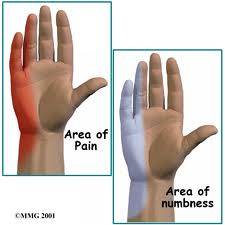Cubital Tunnel – Numb hand from nerve pinched at the Elbow
Facts about Cubital Tunnel Syndrome / Ulnar Nerve Compression
 What is Cubital Tunnel Syndrome?
What is Cubital Tunnel Syndrome?
Cubital tunnel syndrome is a condition brought on by increased pressure on the ulnar nerve at the elbow. The ulnar nerve controls muscles used for gripping and the coordination of fine movements. The nerve passes through the cubital tunnel, a bony passageway. Cubital tunnel syndrome occurs when the ulnar nerve is compressed as it passes through this tunnel behind the elbow. When compressed, the ulnar nerve causes the sharp, tingling sensation that you feel when you hit your “funny bone.”
Cubital Tunnel Syndrome is the second most common peripheral nerve compression syndrome (after carpal tunnel syndrome).
What are the symptoms?
Common symptoms include pain and numbness in the hand, including the ring and small fingers. More severe cases may also lead to a weak grip and pain at the elbow. Often patients suffering from cubital tunnel syndrome have difficulty sleeping at night due to the pain and numbness.
What causes Cubital Tunnel Syndrome?
While the majority of cases of cubital tunnel syndrome are idiopathic, the syndrome has been termed “cell phone elbow,” as it can result from prolonged hyperflexion of the elbow (holding the elbow in a bent position for a long time). Bending the elbow increases the pressure on the ulnar nerve. Sustained bending of the elbow also tends to occur during sleep.
What are the treatment options?
Treatment usually begins with splinting the elbow, especially at night, and anti-inflammatory medications. Surgery may be necessary. Surgery involves either releasing the ulnar nerve from the compression, or actually moving the nerve (an ulnar nerve transposition) to allow more room for the nerve to move behind the elbow.
